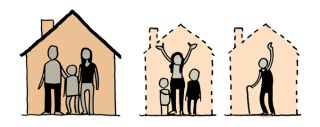Housing cost over burden for tenants remains a major challenge

Problems for tenants with the high cost of accommodation as a proportion of their income and arrears on mortgage, rent and utility bills are an indication of the continued social and economic impact of the high cost of accommodation generally in Ireland. This is one of the key findings from the National Social Monitor – Ireland Social Scoreboard published by Social Justice Ireland.
Almost one in ten renters in Ireland experience a high level of housing cost which takes more than 40 per cent of their disposable income (i.e. all their income after tax is paid and welfare is received). What is really concerning is the increase in the housing cost for tenants renting at the lowest possible rate. This is even more worrying considering that many of these rents are subsidised. Yet the proportion of tenants in this situation has more than doubled since 2016.
Housing costs and arrears
Among some of the main findings of the report are:
Housing costs are the main items of expenditure for many European households, Ireland being no exception. Alongside rent or mortgage payments, these costs include utilities such as electricity and gas. Households experiencing housing cost overburden are likely to find themselves short of cash for other necessities such as food, clothing, transport, childcare and social inclusion. The difficulties many households face in paying market rents is well documented. Those paying reduced or subsidised market rents, despite those subsidies, are also experiencing annual increases in housing cost overburden. The number of tenants on a reduced rent whose total costs of housing exceeds 40 per cent of their disposable income from 4.2 per cent in 2016 to 9.4 per cent in 2019.
Arrears are another area of concern with arrears on mortgage, rent or utility bills another indication that housing costs could be too high. 15.1 per cent of households in Ireland experienced arrears in 2020 compared to an EU average of 8.6 per cent.
Young people who are neither in education nor employment (NEETS)
Another area highlighted in the report is the challenge presented by the number of young people who are neither in education nor employment (known as NEETS).
There are many reasons why the NEET rate is one of the most concerning indicators relative to young people – it indicates detachment and discouragement in relation to both work and education. Low educational attainment is one of the key determinants of young people entering the NEET category with other important factors including having a disability or coming from a migrant background.
The report finds that young people with lower education levels face a three times greater risk of entering the NEET category than those with tertiary education. The OECD average NEET rate (ages 18-24) was 16.1 per cent in 2020, the EU 22 rate was 14.3 percent and the rate for Ireland is 15.2 per cent in 2020.
The fact that the rate is high and is growing is a trend that should be of concern. As we move towards a future where digital transformation will disrupt the labour market, having the greatest impact on people with lower levels of education and skills, it is important that this cohort are not left behind.
Policy Recommendations
Housing
Adopt Social Justice Ireland’s 10 Point Plan to deliver Housing for All to ensure that everyone has access to affordable, secure, stable housing.
Education
Adopt policies to address the worrying issue of youth unemployment. In particular, these should include education and literacy initiatives as well as re‐ training schemes.
NEETS need a long-term policy response, which would encompass alternative approaches aimed at ensuring that people who leave school early have alternative means to acquire the skills required to progress in employment and to participate in society.
The National Social Monitor - Ireland Social Scoreboard is available to download here. This edition of Social Justice Ireland’s National Social Monitor uses elements of the European Pillar of Social Rights Social Scoreboard as a guide to examine Ireland’s progress on some of the commitments made in the European Pillar of Social Rights.